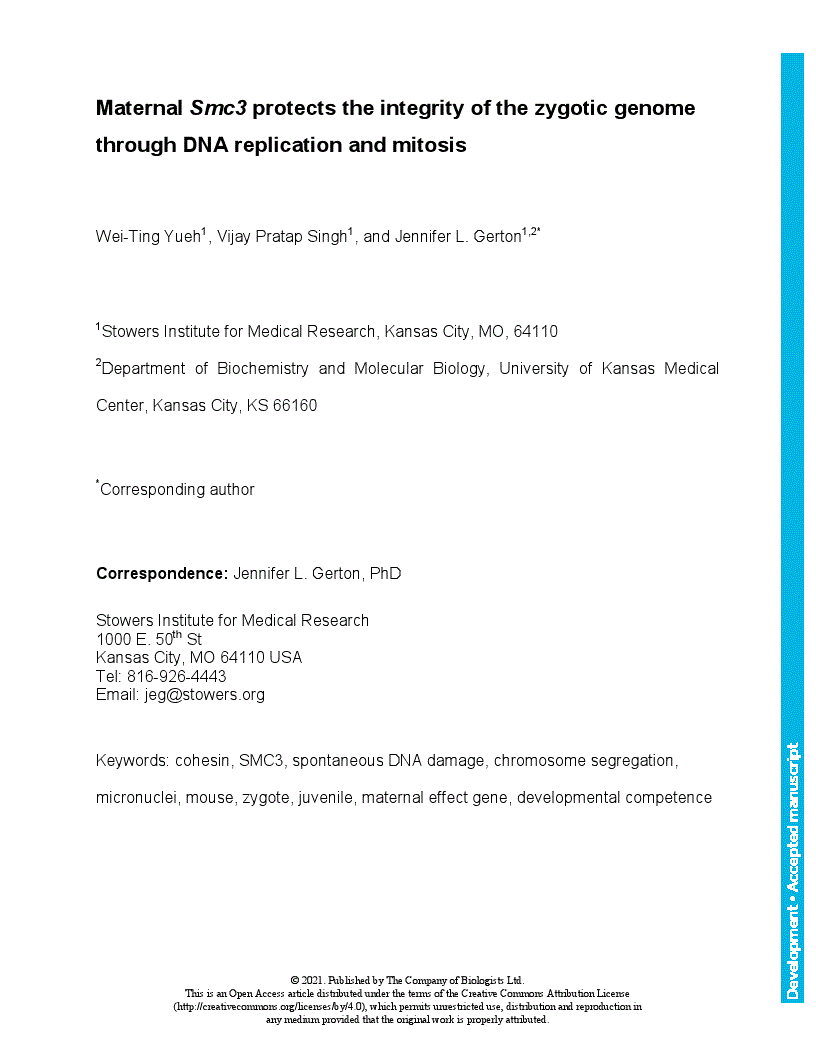Aneuploidy is frequently observed in oocytes and early embryos, begging the question of how genome integrity is monitored and preserved during this critical period. SMC3 is a subunit of the cohesin complex that supports genome integrity, but its role in maintaining the genome in this window of mammalian development is unknown. We discovered that although depletion of Smc3 following meiotic S phase in mouse oocytes allowed accurate meiotic chromosome segregation, adult females were infertile. We provide evidence that DNA lesions accumulated following S phase in SMC3-deficient zygotes, followed by mitosis with lagging chromosomes, elongated spindles, micronuclei, and arrest at the 2-cell stage. Remarkably, although centromeric cohesion was defective, the dosage of SMC3 was sufficient to enable embryogenesis in juvenile mutant females. Our findings suggest that despite previous reports of aneuploidy in early embryos, chromosome missegregation in zygotes halts embryogenesis at the 2-cell stage. Smc3 is a maternal gene with essential functions in repair of spontaneous damage associated with DNA replication and subsequent chromosome segregation in zygotes, making cohesin a key protector of the zygotic genome.
Maternal Smc3 protects the integrity of the zygotic genome through DNA replication and mitosis
- Award Group:
- Funder(s): Stowers Institute for Medical Research
- Award Id(s): NA
- Funder(s):
Currently Viewing Accepted Manuscript - Newer Version Available
- Split-screen
- Views Icon Views
- Open the PDF for in another window
-
Article Versions Icon
Versions
- Version of Record 22 December 2021
- Accepted Manuscript 15 December 2021
- Share Icon Share
-
Tools Icon
Tools
- Search Site
Wei-Ting Yueh, Vijay Pratap Singh, Jennifer L. Gerton; Maternal Smc3 protects the integrity of the zygotic genome through DNA replication and mitosis. Development 2021; dev.199800. doi: https://doi.org/10.1242/dev.199800
Download citation file:
Advertisement
Call for papers: Uncovering Developmental Diversity

Development invites you to submit your latest research to our upcoming special issue: Uncovering Developmental Diversity. This issue will be coordinated by our academic Editor Cassandra Extavour (Harvard University, USA) alongside two Guest Editors: Liam Dolan (Gregor Mendel Institute of Molecular Plant Biology, Austria) and Karen Sears (University of California Los Angeles, USA).
Choose Development in 2024

In this Editorial, Development Editor-in-Chief James Briscoe and Executive Editor Katherine Brown explain how you support your community by publishing in Development and how the journal champions serious science, community connections and progressive publishing.
Journal Meeting: From Stem Cells to Human Development

Register now for the 2024 Development Journal Meeting From Stem Cells to Human Development. Early-bird registration deadline: 3 May. Abstract submission deadline: 21 June.
Pluripotency of a founding field: rebranding developmental biology

This collaborative Perspective, the result of a workshop held in 2023, proposes a set of community actions to increase the visibility of the developmental biology field. The authors make recommendations for new funding streams, frameworks for collaborations and mechanisms by which members of the community can promote themselves and their research.
Read & Publish Open Access publishing: what authors say

We have had great feedback from authors who have benefitted from our Read & Publish agreement with their institution and have been able to publish Open Access with us without paying an APC. Read what they had to say.



